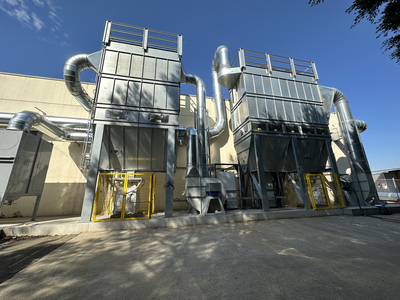This post was originally published on Sustainability Matters

Implementing Nordfab Australia’s packed tower wet scrubber, ducting system, and carbon filter systems can offer several advantages for a green-technology company focused on eliminating electronic waste from landfill and promoting a circular economy.
Here are some key advantages:
Efficient Pollution Control:
The packed tower wet scrubber efficiently removes pollutants and contaminants from exhaust gases produced during the recycling or reprocessing of electronic waste. This ensures compliance with environmental regulations and minimises harmful emissions, contributing to a cleaner environment.
Resource Conservation:
The ducting system facilitates the efficient movement of air and gases within the facility, optimising energy use and reducing resource wastage. This helps in conserving energy, which aligns with the goals of sustainability and reducing the carbon footprint.
Odour and Emission Control:
The carbon filter systems are effective in eliminating odours and capturing volatile organic compounds (VOCs) that might be released during the recycling process. This ensures a safer and healthier working environment for employees and neighbouring communities.
Enhanced Recycling Processes:
By installing these systems, the company can improve its electronic waste recycling processes. Cleaner air and reduced emissions mean better working conditions for employees and can potentially increase productivity and efficiency in handling recycled materials.
Compliance and Reputation:
Adhering to strict environmental standards and utilising advanced pollution control technologies can enhance the company’s compliance profile. This can lead to positive public perception, bolstering the company’s reputation as a responsible and eco-conscious entity in the industry.
Contribution to Circular Economy:
By efficiently managing waste and recycling processes while minimising environmental impact, the company aligns with the principles of a circular economy. This contributes to the goal of reintroducing valuable materials back into the production cycle, reducing the need for raw materials and promoting a more sustainable approach to manufacturing.
Long-Term Cost Savings:
While initial investment might be required for installing these systems, they often lead to long-term cost savings. Reduced energy consumption, minimised waste, and improved process efficiency can result in lower operational costs over time.

In essence, the integration of Nordfab Australia’s systems can significantly support the green-technology company’s mission of eradicating electronic waste from landfill, promoting a circular economy, and ensuring environmentally responsible practices in its operations.





0 Comments